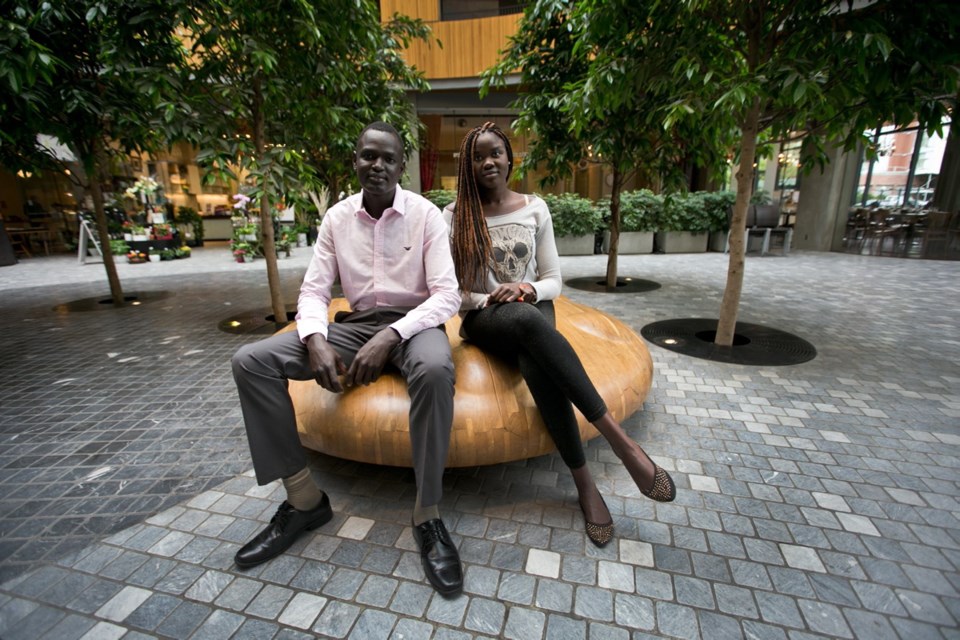Duot Dau doesn’t remember the night his South Sudanese village was attacked, but the next five years are hard to forget.
“We travelled through the thick forest, sleeping under trees,” said the 27-year-old. The war drove his family and neighbours to flee on foot, along with 100 cattle, and eventually sent him to the Kakuma refugee camp in Kenya in the mid-1990s.
There, he made the connections that would lead him on another journey years later to Canada to study in the health field.
This month, Dau and Liz Atong, who is also from South Sudan and lived in the Kakuma camp, were among thousands to receive undergraduate degrees from the University of Victoria.
Both said their unique paths to higher education are thanks in part to a Canadian non-profit organization and the local chapter of fellow students who helped them settle here.
“I grew up in a big family, so it was a bit hard to be by myself. But they help you to be part of the community,” said Atong, 24.
She first heard about the World University Service of Canada program from her older brothers. The organization connects with groups in refugee camps around the world to seek out top academic students involved in their communities.
These students can apply for a scholarship that covers their first year at a Canadian university. The program also helps with visas and travel. Each school has a local chapter that raises funds to cover costs. UVic’s chapter has for the past 15 years sponsored three or four students a year. The university kicks in for tuition, and a student union levy funds living expenses.
“I’ve found it so inspiring to be involved with the students. It’s like a family,” said Cecilia Rose, the UVic chapter general co-ordinator. “We do logistics and academic support but the biggest part is the social aspect. I like to think our potlucks are the best.”
Rose, who also graduated this June, said she came across the group at a clubs day in her second year.
“I felt a bit ignorant about the world at the time and wanted to be involved in something,” she said. Her volunteer work has since led her to help students from Burma, Somalia, Congo, Rwanda and South Sudan.
“I’m very proud of working with WUSC,” she said.
Atong’s older brothers also participated in the program, one at UVic and the other at McMaster University in Hamilton, Ont.
She said they were all inspired to study by her uncle, a medical doctor who chose to work in the refugee camp hospital, despite the difficult conditions. He encouraged them to pursue their education, something her parents also supported.
“My interest in biology came from him,” said Atong, who studied at Vancouver Island University in Nanaimo before transferring to UVic. She plans to take a breather before deciding where her career and studies lead next.
Dau was also inspired by the medical field. When he arrived at the Kakuma refugee camp, “a crowded hell,” he had to cram the eight grades of education he missed into a few years.
“I was lucky because I did very well in my exams,” he said. This led to a good high school, a nursing certificate and his return to South Sudan, where he worked in the local hospital.
“I thought I had problems, but when I saw the conditions and difficulties there … it inspired me to do something,” said Dau, who had to go beyond the call of a nurse’s duty to attend to gunshot wounds, organize immunization campaigns and encourage women to give birth in hospitals.
A friend who was familiar with the WUSC program suggested he go back to the refugee camp in Kenya to see about applying. He did, and came to Victoria in 2009.
While his first thought was to become a doctor, Dau saw the years of school ahead and decided to take a route that would allow him to enter a similar field more quickly.
He graduated with a degree in health and information science and landed a job as a business systems analyst with Maximus Canada after completing a co-op work placement there.
Dau said he’s not sure what his next steps will be — school, work or a return to South Sudan.
“I still feel like I belong in South Sudan, with my family and childhood friends,” he said. “But Canada has given me so much. I have gained a better perspective about the world and can now see things from different dimensions.”



